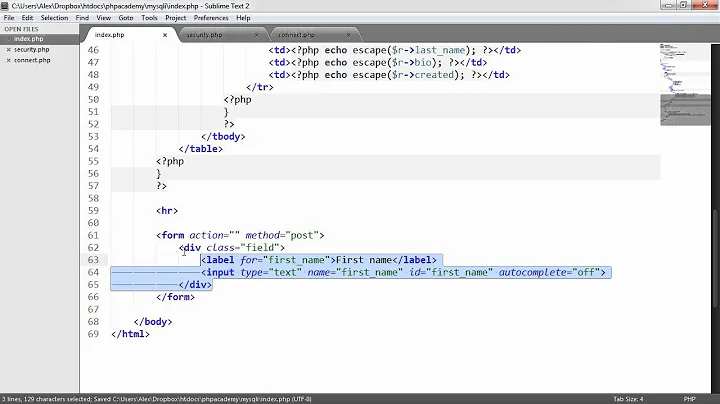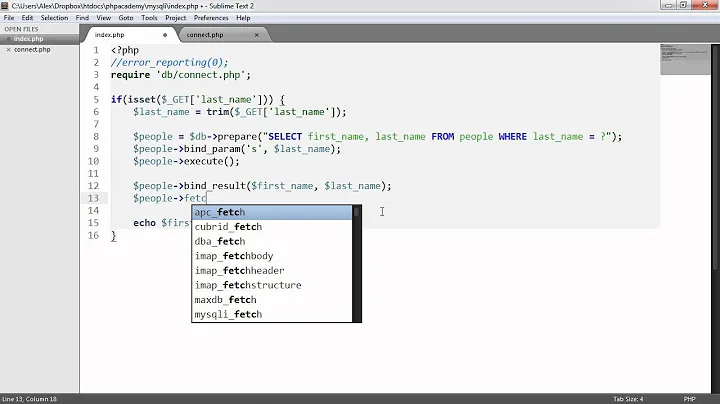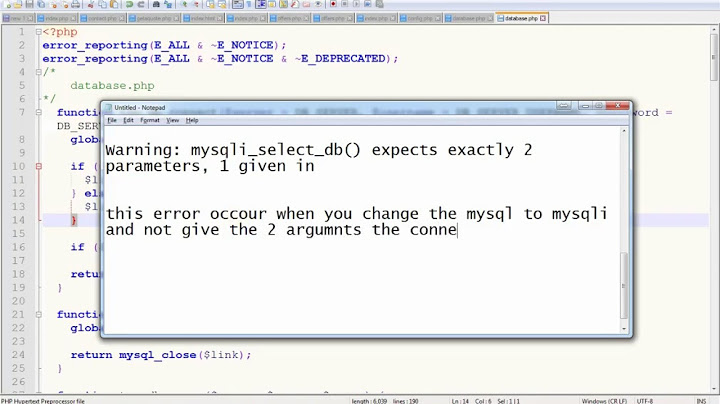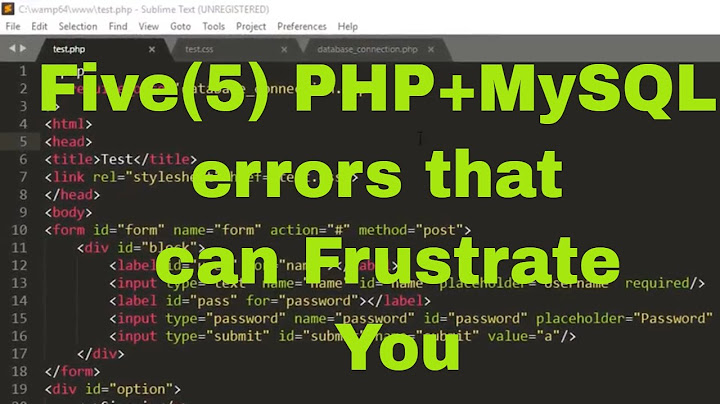mysqli bind_param() expected to be a reference, value given
Solution 1
UPDATE
This answer is outdated. Please use the spread operator in newer PHP versions like answered by Stacky.
From php docu:
Care must be taken when using mysqli_stmt_bind_param() in conjunction with call_user_func_array(). Note that mysqli_stmt_bind_param() requires parameters to be passed by reference, whereas call_user_func_array() can accept as a parameter a list of variables that can represent references or values.
And on the page mysqli-stmt.bind-param you have different solutions:
For example:
call_user_func_array(array($stmt, 'bind_param'), refValues($params));
function refValues($arr){
if (strnatcmp(phpversion(),'5.3') >= 0) //Reference is required for PHP 5.3+
{
$refs = array();
foreach($arr as $key => $value)
$refs[$key] = &$arr[$key];
return $refs;
}
return $arr;
}
Solution 2
Introduced in PHP 5.6, you can use the ... operator ("spread operator") to achieve the same result with less trouble:
//object-oriented
$sql_stmt->bind_param($param_type, ...$params);
//procedural
mysqli_stmt_bind_param($sql_stmt, $param_type, ...$params);
Solution 3
When using mysqli in PHP8.1 or higher, you can pass an array of values directly to execute() which makes for a clean and concise code.
$query = "INSERT INTO test (id,row1,row2,row3) VALUES (?,?,?,?)";
$params = [1, "2", "3", "4"];
$stmt = $mysqli->prepare($query);
$stmt->execute($params);
You can also use PDO, which offers an even more concise syntax.
Related videos on Youtube
Comments
-
 woopata about 2 years
woopata about 2 yearsCan't figure out, whats causing error Parameter 3 to mysqli_stmt::bind_param() expected to be a reference, value given in...
PDO $query = "INSERT INTO test (id,row1,row2,row3) VALUES (?,?,?,?)"; $params = array(1,"2","3","4"); $param_type = "isss"; $sql_stmt = mysqli_prepare ($mysqli, $query); call_user_func_array('mysqli_stmt_bind_param', array_merge(array($sql_stmt, $param_type), $params)); mysqli_stmt_execute($sql_stmt);Also tried OOP
OOP $insert_stmt = $mysqli->prepare($query); array_unshift($params, $param_type); call_user_func_array(array($insert_stmt, 'bind_param'), $params); $insert_stmt->execute();But same error, only that now Parameter 2 is causing problem.
So, what's wrong with $params? I need $params to be an array of values.
-
Marcel Korpel about 11 yearsWhy do you use
call_user_func_array? -
 Your Common Sense about 11 years@MarcelKorpel because mysqli can't be used without
Your Common Sense about 11 years@MarcelKorpel because mysqli can't be used without -
Marcel Korpel about 11 years@YourCommonSense: Why not? In my code, I used mysqli_stmt->bind_param directly.
-
 Your Common Sense about 11 years@MarcelKorpel it's just too manual and prevents any abstraction.
Your Common Sense about 11 years@MarcelKorpel it's just too manual and prevents any abstraction. -
Marcel Korpel about 11 years@YourCommonSense: That still doesn't explain why
call_user_func_arrayis needed. -
 Your Common Sense about 11 years@MarcelKorpel to make abstraction possible. To be able to bind whatever array to whatever query, just passing them as arguments to some helper function, instead of writing all these numerous bind_params right in the application code, making it bloated.
Your Common Sense about 11 years@MarcelKorpel to make abstraction possible. To be able to bind whatever array to whatever query, just passing them as arguments to some helper function, instead of writing all these numerous bind_params right in the application code, making it bloated. -
 Your Common Sense about 11 years@MarcelKorpel or even without any helpers at all - but just in case of
Your Common Sense about 11 years@MarcelKorpel or even without any helpers at all - but just in case of$paramsarray of arbitrary size, which happens pretty often.
-
-
 bitWorking about 11 yearsWith
bitWorking about 11 yearsWithexecuteall params are treated as string. Else you'd need PDO'sbindParamorbindValuewhich doesn't make a big difference. Although I also prefer PDO over mysqli. -
 Your Common Sense about 11 yearsIt's not a much problem, you know. Though, if you want strict type-casting and concise code with conventional SQL, you can use SafeMysql with it's brilliant idea of type-hinted placeholders
Your Common Sense about 11 yearsIt's not a much problem, you know. Though, if you want strict type-casting and concise code with conventional SQL, you can use SafeMysql with it's brilliant idea of type-hinted placeholders -
 bitWorking about 11 yearsYour "brilliant" class doesn't work with real prepared statements.
bitWorking about 11 yearsYour "brilliant" class doesn't work with real prepared statements. -
 NullPoiиteя about 11 years@redreggae i found that class as good as prepared statements ... and yes idea of Your Common Sense is perfectly fine and safe for mysql but in case of php5.5 it wont be useful just because that doesn't support mysql_* function
NullPoiиteя about 11 years@redreggae i found that class as good as prepared statements ... and yes idea of Your Common Sense is perfectly fine and safe for mysql but in case of php5.5 it wont be useful just because that doesn't support mysql_* function -
 bitWorking about 11 years@NullPointer the class works with
bitWorking about 11 years@NullPointer the class works withmysqli_*so it's useful after php5.5. But the point is with prepared statements you get a speed advantage if you run the same query multiple times. I would not say the class is insecure but to me it feels better to let the dbms do the escaping stuff. -
 Your Common Sense about 11 years@redreggae in a typical web-application if you run the same query multiple times, it rather smells of bad design. Not to mention that this speed advantage is a bit too exaggerated. PDO does the same extrapolation by default and nobody actually complained yet.
Your Common Sense about 11 years@redreggae in a typical web-application if you run the same query multiple times, it rather smells of bad design. Not to mention that this speed advantage is a bit too exaggerated. PDO does the same extrapolation by default and nobody actually complained yet. -
 bitWorking about 11 years@YourCommonSense yes this is why I set
bitWorking about 11 years@YourCommonSense yes this is why I setPDO::ATTR_EMULATE_PREPAREStofalse. So tell me what advantage there is to NOT use prepared statements? You could rewrite your class to work the same way and use prepared statements. -
 Your Common Sense about 11 years@redreggae they are cut off with old Occam's razor :)
Your Common Sense about 11 years@redreggae they are cut off with old Occam's razor :) -
 bitWorking about 11 years@YourCommonSense To me it seems simpler to let the dbms do the escaping and good to have the speed advantage if I need it. Hanlon's razor, my friend.
bitWorking about 11 years@YourCommonSense To me it seems simpler to let the dbms do the escaping and good to have the speed advantage if I need it. Hanlon's razor, my friend. -
 Your Common Sense about 11 years@redreggae it is not actually simpler. You actually need more code to handle. Also, natives won't let you to parse a part of query, which makes conditional query building quite a painful task.
Your Common Sense about 11 years@redreggae it is not actually simpler. You actually need more code to handle. Also, natives won't let you to parse a part of query, which makes conditional query building quite a painful task. -
 bitWorking about 11 years@YourCommonSense your class has many good ideas. The downside is the
bitWorking about 11 years@YourCommonSense your class has many good ideas. The downside is the?aand?uplaceholders handle every param as string and the lack of blob type. -
 Your Common Sense about 11 years@redreggae I've never met a case when I would need any of them. Both ?a and ?u works fine for any types. And blobs go fine as strings. What I am missing?
Your Common Sense about 11 years@redreggae I've never met a case when I would need any of them. Both ?a and ?u works fine for any types. And blobs go fine as strings. What I am missing? -
Asa Carter about 7 yearsThis is no longer working for me since upgrading to php 7.1
-
Mindaugas Li over 6 yearsAsa Carter, did you find a solution for PHP 7? Experience the same problem with PHP 7
-
 bitWorking over 6 years@MindaugasLi You can try to use it with Reflection: http://php.net/manual/de/mysqli-stmt.bind-param.php#104073
bitWorking over 6 years@MindaugasLi You can try to use it with Reflection: http://php.net/manual/de/mysqli-stmt.bind-param.php#104073 -
Eborbob over 6 yearsUsing the spread operator (...) as mentioned in another answer is a much cleaner solution.
-
Eborbob over 6 yearsA much cleaner approach than the ones that use
call_user_func_arrayfunction. -
 Kellen Stuart over 6 yearsIs it a coincidence I see the same code in the file I was editing? I think not
Kellen Stuart over 6 yearsIs it a coincidence I see the same code in the file I was editing? I think not -
Tony over 3 yearsThis is solution for ALL. Simple and work everywhere
-
 TheRealChx101 over 2 yearsWhat is
TheRealChx101 over 2 yearsWhat isparam_type? What goes there? -
Stacky over 2 years@TheRealChx101 The variables in this answer are derived from the original question above. So in this case,
$param_typeis"isss"and$paramsisarray(1,"2","3","4").









